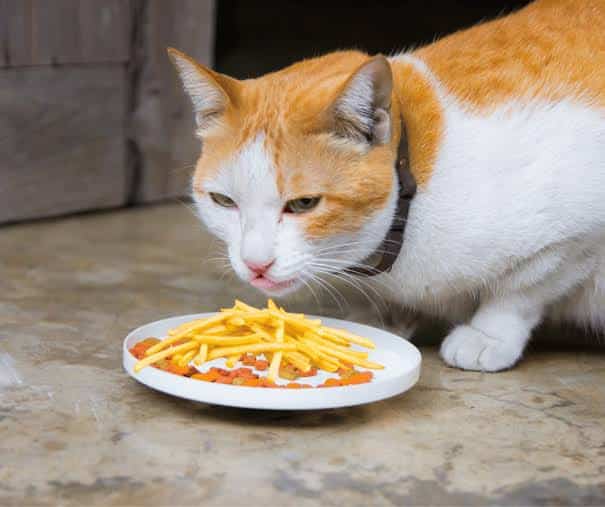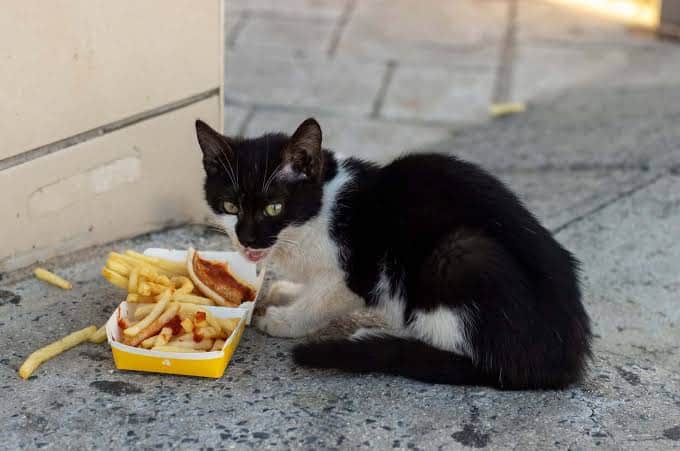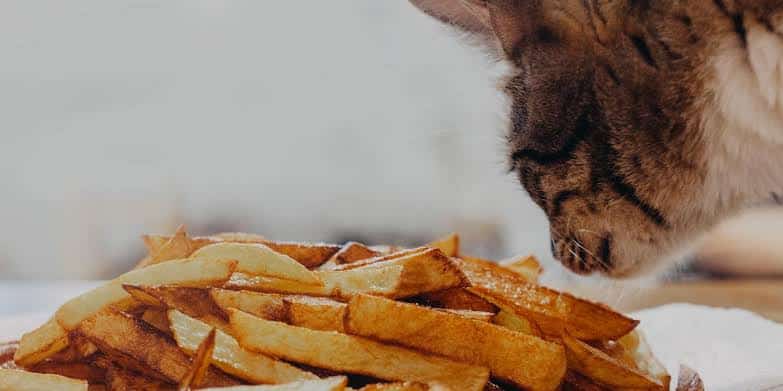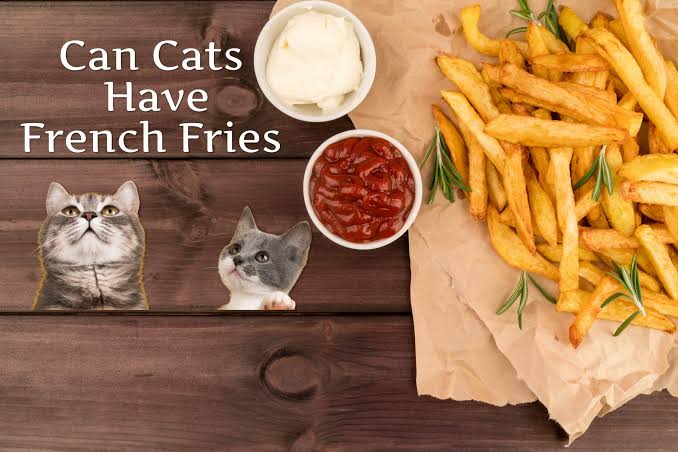Cats are notorious for their curious appetites, often eyeing their owners’ meals with interest. But when it comes to sharing human food, caution is key. One common question among cat owners is, “Can Cats Eat French Fries?”.
Understanding Cat Nutrition
In the wild, cats are skilled hunters, preying on small mammals, birds, and insects to fulfill their nutritional needs. This evolutionary adaptation has shaped the dietary requirements of domestic cats, emphasizing the importance of animal-based proteins and fats in their diet.
Natural Diet Of Cats
In the wild, cats consume prey animals in their entirety, including muscle meat, organs, bones, and even small amounts of plant matter from the stomach contents of their prey. This diet provides cats with essential nutrients such as protein, amino acids, vitamins, and minerals in their most bioavailable form.
Recommended: What does Catnip do to Cats?
Dietary Requirements
- Protein: Cats require high-quality animal protein to meet their unique nutritional needs, particularly essential amino acids like taurine, which is crucial for heart and eye health.
- Fat: Fat provides cats with a concentrated source of energy and essential fatty acids necessary for skin and coat health, as well as overall metabolic function.
- Water: Cats have a low thirst drive and rely heavily on moisture from their food for hydration. Wet cat food or a balanced raw diet can help ensure adequate hydration.
Digestive System Of Cats
Cats have a relatively short digestive tract compared to omnivores like humans, reflecting their evolutionary adaptation to a meat-based diet. The digestive system of cats is optimized for processing animal proteins and fats efficiently.
- Teeth: Cats have sharp, pointed teeth designed for tearing and chewing meat, rather than grinding plant matter.
- Stomach: The stomach of a cat is highly acidic, allowing for the efficient breakdown of meat and bone.
- Intestines: Cats have a relatively short small intestine, which limits the digestion of carbohydrates. They lack certain enzymes needed to break down plant-based foods effectively.
- Nutrient Absorption: Cats have specialized mechanisms for absorbing nutrients from animal-based proteins and fats, ensuring they obtain essential nutrients from their diet.
How It Differs From Humans
Unlike humans, who can thrive on a varied diet that includes plant-based foods, cats have specific nutritional requirements that must be met through animal-derived sources. Feeding cats a diet that is high in carbohydrates or deficient in essential nutrients can lead to health problems, including obesity, diabetes, and nutrient deficiencies.

Nutritional Analysis Of French Fries
French fries are a popular and indulgent snack enjoyed by many humans, but how do they stack up in terms of nutritional value for our feline friends? Let’s take a closer look at the composition of French fries and how it aligns with the dietary needs of cats.
Macronutrients:
- Fat: French fries are typically deep-fried in oil, making them high in fat. While cats require fat in their diet for energy and essential fatty acids, excessive fat intake can lead to weight gain and other health issues.
- Carbohydrates: Potatoes, the main ingredient in French fries, are rich in carbohydrates. However, cats have limited ability to digest and metabolize carbohydrates, as their digestive systems are optimized for processing animal-based proteins and fats.
- Protein: French fries contain minimal amounts of protein, which is essential for cats’ overall health and well-being. Cats require high-quality animal protein to meet their unique nutritional needs, and French fries do not provide an adequate source of protein.
Micronutrients:
- Sodium: French fries are often seasoned with salt, making them high in sodium. While sodium is an essential nutrient for cats, excessive sodium intake can lead to health problems such as hypertension and kidney disease.
- Vitamins and Minerals: French fries are not a significant source of vitamins and minerals that cats require for optimal health. Cats have specific dietary requirements for nutrients such as taurine, vitamin A, and vitamin D, which are essential for various physiological functions.
Recommended: Can Cats Eat Chocolate?
Can Cats Feed On French Fries?
Feeding French fries to cats is not recommended. While a small nibble might not immediately harm your cat, it’s important to understand that French fries are not nutritionally suitable for cats and can potentially lead to health problems if consumed regularly.
Risks Of Feeding French Fries To Cats
While it might be tempting to share your French fries with your feline friend, it’s essential to be aware of the potential risks associated with feeding them this human food. Here are some reasons why French fries are not a suitable treat for cats:
1. Digestive Upset:
French fries are high in fat and carbohydrates, which can be difficult for cats to digest. Feeding them French fries can lead to digestive upset, including vomiting, diarrhea, and discomfort.
2. Nutritional Imbalance:
French fries lack essential nutrients that cats need for their overall health and well-being. Cats require high-quality animal proteins, essential fatty acids, and specific vitamins and minerals in their diet, none of which are provided by French fries.
3. Obesity:
French fries are calorie-dense and can contribute to weight gain and obesity in cats if consumed regularly. Obesity in cats can lead to a range of health problems, including diabetes, joint issues, and a reduced lifespan.
4. Sodium Toxicity:
French fries are often seasoned with salt, which can be harmful to cats in large quantities. Excessive sodium intake can lead to sodium toxicity, causing symptoms such as dehydration, electrolyte imbalances, and kidney problems.
5. Long-Term Health Effects:
Feeding French fries to cats as a regular treat can have long-term effects on their health. Chronic consumption of high-fat, high-carbohydrate foods can increase the risk of obesity, diabetes, and other metabolic disorders in cats.
Recommended: Can Cats Eat Popcorn?

Alternatives To French Fries For Cats
While French fries are not a suitable treat for cats due to their nutritional composition and potential health risks, there are plenty of safer and more appropriate alternatives that you can offer your feline friend. Here are some cat-friendly alternatives to French fries:
1. Commercial Cat Treats:
Commercial cat treats are specially formulated to meet the nutritional needs of cats while providing a tasty reward. Look for treats made from high-quality ingredients, such as real meat or fish, and avoid those that contain excessive fillers or artificial additives.
2. Cooked Meat:
Small amounts of cooked meat can be a delicious and nutritious treat for cats. Offer your cat lean meats such as chicken, turkey, or fish, cooked without any seasoning or added ingredients. Be sure to remove any bones and skin before feeding the meat to your cat.
3. Freeze-Dried Meat or Fish Treats:
Freeze-dried meat or fish treats are a convenient and shelf-stable option for cat treats. These treats are made from real meat or fish that has been freeze-dried to preserve its natural flavor and nutrients. They are often available in a variety of flavors to appeal to different tastes.
4. Catnip:
Catnip is a natural herb that many cats enjoy. Offer your cat fresh catnip leaves or catnip-infused toys as a safe and stimulating treat. Be mindful that not all cats are affected by catnip, so it’s best to observe your cat’s reaction before offering it as a treat.
5. Homemade Treats:
You can also make your own homemade cat treats using simple, cat-friendly ingredients. Recipes for homemade treats often include ingredients such as canned tuna, canned pumpkin, or baby food meats. Just be sure to follow a vet-approved recipe and avoid any ingredients that may be harmful to cats.
Recommended: Can Cats Eat Mango?

Frequently Asked Questions
Can Cats Eat French Fries?
While a small amount of French fries may not immediately harm your cat, it’s not recommended to feed them this human food. French fries are high in fat, carbohydrates, and sodium, and they lack essential nutrients that cats need for their overall health.
What Are The Risks Of Feeding French Fries To Cats?
French fries are high in fat and carbohydrates, which can be difficult for cats to digest and can contribute to weight gain if consumed regularly. Additionally, the high sodium content in French fries can lead to dehydration and kidney problems in cats.
What Are The Alternatives To French Fries For Cats?
Yes, there are plenty of safe and healthy alternatives to French fries that you can offer your cat as a treat. Commercial cat treats made from high-quality ingredients, such as real meat or fish, are a popular option. You can also offer your cat small amounts of cooked meat, freeze-dried meat or fish treats, fresh catnip leaves, or homemade treats made from cat-friendly ingredients.
How Should I Introduce Treats To My Cat’s Diet?
When introducing treats to your cat’s diet, it’s essential to do so in moderation. Start by offering small amounts of treats as a reward for good behavior or during training sessions. Monitor your cat’s reaction to the treats and adjust the amount accordingly to prevent overfeeding. Be mindful of your cat’s overall calorie intake and ensure that treats are balanced with their regular diet.
Recommended: Can Cats Eat Raspberries?
Conclusion
To ensure the health and well-being of your cat, it’s best to avoid feeding them French fries altogether. Instead, opt for safe and healthy alternatives that are specifically formulated for cats, such as commercial cat treats made from high-quality ingredients, small amounts of cooked meat or fish, freeze-dried meat or fish treats, fresh catnip leaves, or homemade treats made from cat-friendly ingredients.
By prioritizing your cat’s nutritional needs and offering them balanced and appropriate treats, you can help ensure that they enjoy tasty snacks without compromising their health. Remember to always consult with your veterinarian if you have any concerns about your cat’s diet or health, and to prioritize their well-being above all else.

